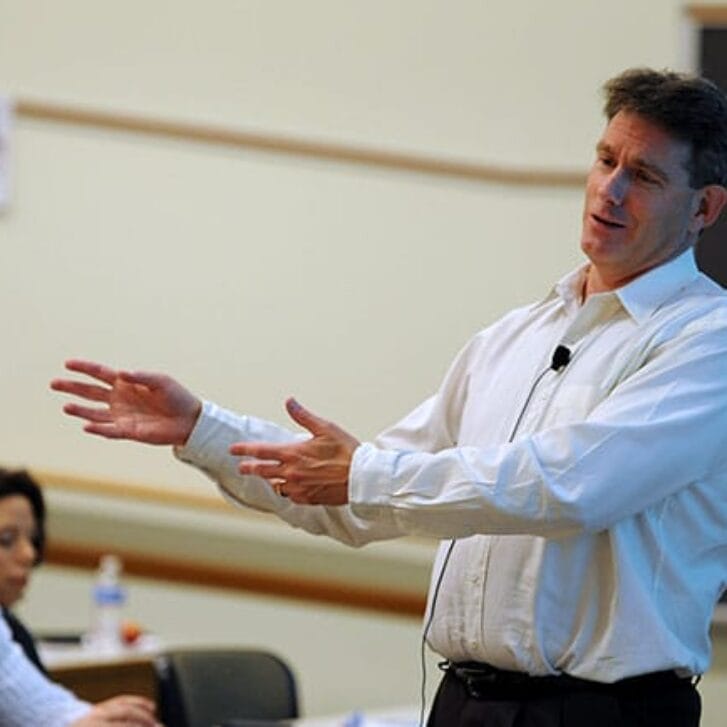Manuel V. Pangilinan, WG’68
 To understand, on a somewhat philosophical level, why Hong Kong-based First Pacific Co. Ltd. has been successful, it helps to think in terms of paradoxes.
To understand, on a somewhat philosophical level, why Hong Kong-based First Pacific Co. Ltd. has been successful, it helps to think in terms of paradoxes.
This $7 billion Asian conglomerate, whose core businesses today include telecommunications, real estate, trading and banking, is “neither east nor west, but a blend of the two,” says Managing Director Manny Pangilinan. West, in that it conforms to the financial discipline and accounting disclosure requirements followed by most western countries, but east in that “we can be comfortable, if needed, with ambiguity in our business relationships. That is very Asian, and it’s especially important when dealing with the political milieu in countries like Thailand or the Philippines.”
First Pacific has also been called an “oxymoron,” Pangilinan adds, “because we define ourselves as an investment and management company.
“Somebody once told me you can’t do that. Either you are an investment company and should forget about managing, or you are a management company and should forget about investing. We said no. We should not only make good investments, but we should manage them as well. We at corporate don’t pretend to run the companies we own but we are intrusive. We have to know what is going on, both strategically and financially.”
Pangilinan’s approach to management has clearly paid off. A recent Business Week magazine profile of First Pacific described the company as “one of Asia’s most dynamic conglomerates” and Pangilinan as a model of “the new Asian manager.” Given First Pacific’s phenomenal success these days — earnings in 1996 were in excess of $200 million and the stock has increased tenfold since 1991 — one wonders exactly what aspect of the First Pacific story is referred to: the company’s adroit mix of management professionalism and entrepreneurship, or perhaps Pangilinan’s own penchant for risk-taking and the connections he has established with some of Asia’s most powerful political and corporate leaders.
In 1981, Pangilinan started First Pacific with the help of four Indonesian families, including the Salim Group, and public funds. The relationship with the Salim Group sprang from a friendship between Pangilinan, the son of a Manila banker, and Anthony Salim, the son of Liem Sioe Liong, the Salim Group’s founder.
The initial plan hatched between the two was to be “intermediaries of capital, sort of a financial supermarket where one could buy securities or get a loan or whatever,” says Pangilinan, who is also a friend of Philippine President Fidel Ramos. “That was one leg. The other was to be an intermediary of goods.”
Then in 1988, Pangilinan, over the objections of some of his closest advisers, invested in a Hong Kong cellular company called Chinatel. With about 2,500 subscribers and outmoded technology, Chinatel at that point was the smallest of three cellular operators in Hong Kong. “We invested $50 million just to buy airwaves,” says Pangilinan. “But I felt it was a good investment because the teledensity of Asia [the number of phones per capita] was very low and fixed wire operators didn’t really appreciate the potential of wireless systems. Asia must rely on wireless technology to bring as many basic dial tones as it can to the population at the lowest possible cost.”
Today First Pacific’s wholly-owned sub-holding company for its many telecommunications businesses is called Asia Link. It’s a thriving regional cellular communications company with more than 600,000 subscribers in six countries and a strong future as a savvy “niche player” in Asia.
In the trading area, First Pacific owns companies in more than 40 countries worldwide, selling everything from Bally shoes to food snacks to corrugated carton boxes. In banking, First Pacific is strengthening its banking operations in Hong Kong and expanding into China in partnership with one of China’s state ministries, the Ministry of Foreign Trade and Economic Cooperation.
In the property area, First Pacific has been the leader of a consortium that last year spent $1.6 billion on the redevelopment of the huge Fort Bonifacio military base in central Manila with plans to transform it into a modern, world-class office/residential city.
Even as First Pacific continues to earn accolades in the business community, Pangilinan is quick to note that the company has not been infallible. In 1990, for example, First Pacific made what initially looked like an unwise investment in an Australian IT company; invested in the second largest trading company in Holland before realizing that its foray would be stoutly resisted, and lost money on a processed meat factory in Thailand.
“It was a dark time for us,” Pangilinan says. “But we pulled ourselves out and learned that you have to focus on your core businesses and manage those well. The transition was difficult because the thrill of the chase in doing deals can be very seductive.”
Pangilinan was born in Manila and earned his BA in economics from Ateneo de Manila University, a Jesuit-run school with a strong reputation in the humanities. His favorite professor was in the philosophy department and indeed, Pangilinan credits the school with influencing his perspective of the world and of human relationships.
Today, he feels very strongly that the number one challenge facing Asia is people. “While Asia gives the impression of being vast and highly populated, we have a dearth of excellent managers and some countries can be xenophobic about foreigners. Yet part of Hong Kong’s success as a financial center is that it has allowed, to a large degree, foreign professionals — from lawyers to investment bankers to publishers — to come in and do business there because it is not only the hardware of buildings, infrastructure and money that creates markets but the software of people. That’s what makes Hong Kong so vibrant.”
First Pacific, for example, is run by professional managers from many different countries, including Asia, America, Australian and Europe. Before starting the company, Pangilinan himself held executive positions with American Express International Banking Corp. and Philippine Investment Management Consultants, Inc.
As to Hong Kong’s future under Chinese rule, Pangilinan is “an idealist without any illusions. Already, the Chinese influence is increasing and the British influence is waning,” he says. “Politically and economically, everyone wants a smooth transition. We feel China’s intentions are sincere and that the Chinese are serious about continuing, if not increasing, the prosperity of Hong Kong if only to prove, for themselves as well as others, that they can do a better job. It’s a question of face. They want to see Hong Kong prosper more under their leadership than it did under the British.
“Beyond that, the situation will be influenced by politics. In China, as we all know, when sovereignty considerations collide with commercial considerations, political objectives can sometimes be paramount.”
In addition to the need for adequately trained and diverse people, Asia faces other challenges as well, Pangilinan says. High on the list is the need for homes. Securitization of mortgages would help. “Asia lacks the financing for houses and infrastructure, in part because banks and local governments have limited capabilities in this area,” says Pangilinan. “And whatever funds might be available usually do not have the maturity profile required by the user of such funds. We should strive to create a secondary market for mortgages, like the one that exists in the U.S.” Asia also needs a stronger bond market, he adds, noting that historically the stock market has been more robust because of the dominance of bank financing, the lack of bond market expertise and the negative effects of government policies such as the withholding tax on bond interest.
Pangilinan declines to speculate on the number of hours he works, although he does note that in addition to playing squash twice a week, he can sometimes be found at a gym located in his building. He arrives at 9 p.m., stays until closing time at 10 p.m. and then returns to his office until midnight. He works Sundays as well.
Perhaps his pace is an echo of Asia’s own hell-bent push for growth and development. “What could happen to Asia many years from now is what is happening to companies in Europe and the U.S. today,” he says. “As your domestic markets get saturated and as economies grow only two to three percent a year, you have to seek markets offshore …
“First Pacific is serious about developing an intensive Asian presence … We want to grow with Asia. That’s how we see the future.”
Kathleen A. O’Neil, WG’76
 Kathleen A. O’Neil, executive vice president and head of the corporate group at the Federal Reserve Bank of New York, remembers interviewing at the bank 21 years ago for the job of information analyst.
Kathleen A. O’Neil, executive vice president and head of the corporate group at the Federal Reserve Bank of New York, remembers interviewing at the bank 21 years ago for the job of information analyst.
“What I found appealing was the bank’s role in the financial system,” says O’Neil, who functions today as the bank’s chief administrator, chief financial officer and chief credit/risk manager. “We are, on the one hand, an active participant in financial markets like the government securities market and the foreign exchange market, but we also are a standard setter both in the U.S. and abroad, not so much officially as by the weight of our influence …
“What I also found intriguing was working for an organization that deals with systemic risk, where you look beyond an event’s impact on your own institution to the potential ripple effects that it would have on an entire market or on institutions beyond that initial market. It’s basically a concept of relatedness. Financial markets and institutions are highly interrelated not just through their connections to each other but through technology, through the speed of information, and so forth.”
O’Neil’s decision to take the information analyst position launched her on the fast track at the New York Fed. Today, as one of the top two women at the bank, she is in charge of credit and risk management, human resources, planning and control, public information, accounting and service functions, the office of corporate consultancy, the office of regional and community affairs and the secretary’s office. She manages 579 employees and a budget of $52 million.
It’s an eclectic set of responsibilities. Her accounting function, for example, includes the development of new financial statements and footnotes that more closely reflect GAAP (generally accepted accounting principles). In the credit and risk management area, O’Neil has been studying how the federal reserve system organizes, on a system level, its approach to risk management, “from our lending functions to our credit functions to the management of reserve requirements and other risk related issues.”
In the human resources area, she has been evaluating experimentation with flexible work arrangements rolled out in early 1996. As overseer of the office of regional and community affairs, she recently headed up a technical assistance effort for the neighborhood housing service designed to help potential homeowners better understand the financial requirements of homeownership.
In the planning and control area, O’Neil is analyzing long-range office needs over the next five-to-ten years as well as trying to improve performance measurements and internal reporting systems. In the public information area, she is involved in evaluating the Fed’s Internet home page, while in the internal communication and multimedia services area she has looked at increasing the level of presentations and use of multimedia tools.
During the last six years at the Fed, O’Neil has undertaken a number of special projects, including: designing and supervising a technical assistance mission for the Argentine Bank Supervisory Authority; serving as an adviser to the Governor of the Central Bank of Kuwait on a technical assistance mission; and representing the bank on a committee to develop a code of conduct for the wholesale financial markets.
O’Neil went to high school in Akron, Ohio and graduated from John Carroll University in Cleveland. She and her husband, a lawyer for Texaco, live in Riverside, Conn., and have three children, ages 15, 13 and 9. The challenges of working fulltime and raising a family have been eased by live-in nannies when her children were younger and by a husband who shares the family responsibilities and “is a terrific partner,” she says.
“I have been lucky in having had a very broad range of assignments at the Fed,” notes O’Neil. “As a result I have a perspective on the institution and its responsibilities that helps me appreciate it and be effective.”
Anthony Hamilton-Russell, WG’90
 Anthony Hamilton-Russell spends his evenings reading wine journals and his days worrying about everything from the stakes holding up his camphor trees to the types of products he should be selling in the year 2020.
Anthony Hamilton-Russell spends his evenings reading wine journals and his days worrying about everything from the stakes holding up his camphor trees to the types of products he should be selling in the year 2020.
He is the owner of a vineyard 70 miles southeast of Cape Town, South Africa, a boutique winery that his father started in 1975 and ran until Anthony returned in 1991. Hamilton Russell Vineyards employs 37 people, sells 30,000 cases per year of high-priced Pinot noir, Sauvignon blanc and Chardonnay in 15 different countries, and represents a sudden shift in career for its owner.
Hamilton-Russell was a financial analyst in corporate finance at Morgan Stanley in London during the late 1980s when he decided to switch to the field of consulting. After getting his MBA from Wharton, he landed a job with Bain & Co. in its London office.
“I was lucky enough to experience consulting at a peak and in a trough. I learned an enormous amount from working at Bain, but my medium-term goal of moving into venture capital as a principal seemed less viable in the climate prevailing at the time … At the end of a year, I began reviewing my options.”
Coincidentally, the family wine business was in need of hands-on management. “I picked up the phone, called my father and said I would like to get involved. He was delighted. I returned home on Friday, Sept. 13, 1991.”
In running the business side of the vineyard, Hamilton-Russell focuses on hiring, motivating, setting budgets and standards and devising marketing strategy. Although he took wine courses and produced wine on a small scale in the early ‘90s, he leaves that part of the process to the winemaker. “Finding and developing the right people is my biggest challenge as owner,” he notes. “In a small business you are especially sensitive to employee performance. We are in an environment where good people are very expensive and ordinary people are very damaging.”
There is also the “constant agitation for improvement, for reinvestment of profits and for change,” he notes. “Nothing is stable for very long.”
Including the climate, he might add. “Although we have a cool maritime climate — which means we don’t get washed-out vintages alternating with top notch ones, as some French regions do — there are still vintage variations. It lends an aura of risk to the operation every year because you never get complete consistency of character or quantity. But that also adds an element of excitement.”
Hamilton-Russell was born in Cape Town, South Africa, earned a BS in zoology and genetics at the University of Witwatersrand and graduated from Oxford with honors in geography. His English-born wife is an artist and they have twin daughters, age 4.
Hamilton-Russell harbors no regrets about the course his career has taken. “I am self-employed and my options to maneuver are completely different than they were six years For example, I couldn’t go back and work in a structured corporate environment unless I was running the company …
“What interests me are the courses you are offering at Wharton on managing a family business, how to balance work and personal life and so forth. I suppose the trends driving the need for these courses have been driving me.”

























